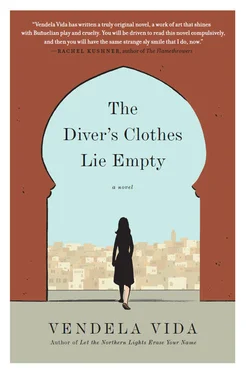“And you’re going to stand him up?”
She sighs as though you’re to blame for the situation she’s in.
“I don’t feel like it. I know he’s seen pictures of me with other people recently and I know he’s going to be pissed and I’m just not up for it. I think he’ll be just as happy to see you.”
You tell her there’s very little chance he’ll be excited to see you if he’s expecting her.
“He might be upset for, like, five minutes,” she says. “Tops. Then he’ll be happy to have a young woman to talk to.”
You look at the sky. You look at the pool.
“I don’t think I can do it,” you say.
“I think you can,” she says.
“I don’t know.”
“I think you can, Reeves, or whatever your real name is.”
You look at her, but she’s lying flat on the chaise longue now, staring at the hotel as though its profile is interesting. She’s threatening you, you’re sure, but she doesn’t look threatening. She is brilliant. You’re confused. You start to sweat.
“Okay,” you say. “I’ll do it.”
“Really?” she says, sitting up now. She acts as though you’re doing her a favor. She’s acting as though there’s no way in the world she could have implied she would turn you in if you didn’t agree. And she’s so convincing that for a moment you think you might have imagined that she would blackmail you.
“Promise you’ll make sure to show him a good time?”
You wonder what this means. “My clothes are staying on,” you say.
“Of course they are,” she says in a slightly reprimanding tone. “The car will be here at seven thirty. Just give him my regards and say I’m so sorry I got caught working late.”
She stands to leave.
“What’s his name?” you call out after her.
“Leopoldi,” she says.
You watch her and the bodyguards as they reenter the building. The Moroccan sky above you is pale blue and cloudless, like the sky in a musical production for children.
When you return to your room, you find a green silk dress on your bed. It’s lying flat with one sleeve down and the other raised up, as though holding a glass and making a toast. You shouldn’t be surprised she already has a dress picked out and has sent it to your room. It was most likely already lying here on your bed even before she approached you at the pool. It’s 8:30 A.M. You have to get to the van.
You shower and dress for the day on set. It’s a relatively simple shoot compared to yesterday’s scene in traffic. In today’s scene Maria enters a mosque to pray for Kareem, but she’s uncertain about how to position herself. At first she’s on her knees with her palms pushed together the way she readied herself for prayer during her Catholic childhood. Once situated, she furtively glances around and sees the Moroccan women are on their knees, but seated back on their heels. Their eyes are closed and their palms extended, as though holding open a book. Maria ends up sitting the way the women around her are sitting, and praying the way they are praying. She prays until she starts sobbing.
There are no lines in today’s scenes. The script supervisor has warned you that the director is very indecisive about today’s shoot; much of it will be improvised on the spot. So much of it will depend on how well the famous American actress can pull off the scene. There are tears involved: a risky proposition. The famous American actress was criticized for the last film in which she cried. It was an ill-advised romantic comedy set in Rome. Her chin quivered melodramatically. You have a vague recollection of a spoof of her crying scene on Saturday Night Live. But then your memory becomes clearer and you remember she was in that spoof; she went on Saturday Night Live to make fun of herself. And it worked to her advantage; the public forgave her, the public loved her for mocking her own performance. She has good PR people, the American actress does.
You wonder for a moment if it’s the PR people who have instructed her not to go on the date tonight. Maybe her cancellation on the businessman has little to do with her level of affection for him, and more to do with how it will look to anyone who sees them on a date and documents the sighting. Photos of her and the current young boyfriend on a sailboat named the Ooh La La have been prevalent in the weekly magazines as of late. One headline said: YO HO HO ON THE OOH LA LA !
You descend to the lobby and exit the hotel and step into the van, where the Indian producer and the twenty-five-year-old are already seated, waiting for you. You don’t know how you fell a few minutes behind. You blame the actress, and mention that she needed to talk to you about something important.
“Is she nervous about the scene today?” the Indian producer asks.
“No,” you say, and because you’ve already learned that he likes scandal, he likes gossip, you reiterate it. “No, she’s not at all nervous.”
“ I’m nervous about the crying scene,” says the young American producer. “If it were up to me, she would not be shown crying. Not after what happened in that ridiculous Italian rom-com fiasco.”
You think he has a point, but you can’t say anything. You can’t betray her. This is the unwritten contract between the talent and the stand-in. Or at least in your case.
You arrive at the mosque and you think you hear yourself inhale sharply. Or maybe it’s the three of you — the Indian producer, the twenty-five-year-old, and you — who are collectively caught off guard at the same time. The mosque is enormous, and situated on the water — at first you think it’s on its own island. It’s white and turquoise with an intricately tiled minaret topped with a gold point as firm and narrow as the needle of a compass. There’s a short line of tourists waiting to get into the mosque. You’ve been told it’s one of the only Moroccan mosques that allows non-Muslims to enter.
The van pulls up to one of the trailers parked outside the mosque and the costume department outfits you in a long skirt and a long-sleeved blouse, and the wig. You are given a scarf to place around your hair. No shots of you in the distance will be filmed today, so they let you arrange the scarf yourself.
From the side of the mosque you see a series of double doors in the shape of pointed arches and framed by columns. Some of the doors are clad in bronze. The film crew enters through one of the bronze-clad doors and is escorted up to a room on the second floor.
The stairway itself has multiple arches and decorative woodcarving. You are told that they lead to the Women’s Gallery, which is hidden from view from the enormous prayer hall below. When you enter the Women’s Gallery you are overcome by the size of the room — it could easily fit five thousand women. Chandeliers hang in a row down the center of the room, between a series of high scalloped archways. The floors are tiled, keeping the temperature of the room cool.
The film crew takes half an hour to set up their equipment. The director paces, looking apprehensive about this scene. He holds his head between his hands as though to suggest the vise grip on his brain.
The extras are Moroccan women of all ages, wearing clothes appropriate for a mosque. You watch as they store their shoes in the small shoe compartments that have been built into the prayer rugs and kneel toward Mecca. You wonder if they are actually using this time to pray.
The director calls you over and instructs you to enter this room of the mosque as though in awe. This is not difficult. You enter the room and admire the architecture. You walk over to where the women are praying. You remove your shoes and store them in the prayer rug’s compartments. You adjust your scarf around your head, making sure you’re more than adequately covered, and sit back on your heels. You assume the same position as the women around you.
Читать дальше












